#inter-state cooperation
Explore tagged Tumblr posts
Text
Assam CM Thanks Jharkhand Counterpart for Rs 2 Crore Flood Aid
Rare gesture of goodwill amid political tensions between the two states Assam’s flood-hit residents receive support from Jharkhand, fostering inter-state cooperation despite recent political disagreements. RANCHI – In an unexpected turn of events, Assam Chief Minister Himanta Biswa Sarma expressed gratitude to his Jharkhand counterpart, Hemant Soren, for a generous flood relief contribution. The…
#Assam floods#assembly elections#राज्य#BJP#demographic changes#flood relief#Hemant Soren#Himanta Biswa Sarma#inter-state cooperation#Jharkhand aid#JMM#political tensions#state
0 notes
Text
U.S., Philippines Kick off Largest-ever Balikatan Exercise as Defense, Foreign Affairs Leaders Meet in Washington (April 11, 2023)
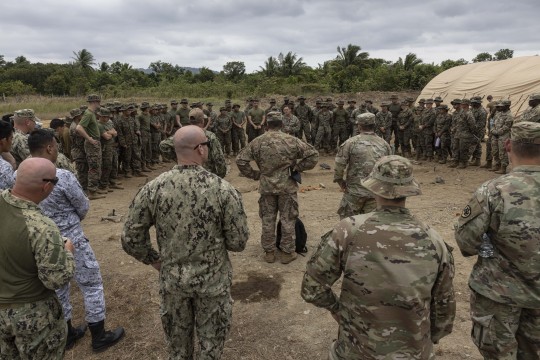
▲ U.S. Marines with 3rd Landing Support Battalion, Army Soldiers, Navy Sailors, and members of the Armed Forces of the Philippines listen during a rehearsal of concept brief in preparation for Balikatan 23 at Camp Agnew, Casigueran, Philippines on April 4, 2023.
from USNI news by Rene Acosta and John Grady
MANILA – The Philippines and the United States began the largest iteration of Balikatan, the annual military exercise involving Filipino and American troops, during a Tuesday ceremony at the Philippine military’s general headquarters of Camp Aguinaldo in Quezon City.
Armed Forces of the Philippines Chief of Staff Gen. Andres Centino opened the exercise on Tuesday as defense and foreign affairs officials also met for the 2+2 Ministerial Dialogue in Washington D.C., to discuss the direction of the alliance between the two countries.
“For the Armed Forces of the Philippines, in particular, this year’s Balikatan Exercise is most timely as we fast-track the enhancement of our capabilities for maritime security and domain awareness, as well as our employment concept of newly acquired equipment and weapon systems under our modernization program and application of newly developed doctrines – with the end-in-view of projecting a credible defense posture,” Centino said.
More than 17,600 American, Filipino and Australian sailors, Marines, soldiers and airmen will participate in the exercise, Enrique Manolo, secretary of foreign affairs, said in Washington, D.C., on Monday at the Center for Strategic and International Studies.
The exercise illustrates the importance Manila places on internal security, Manolo said, and signifies another step in modernizing the more than 70-year-old alliance between the United States and the Philippines.
The increased emphasis on interoperability required to address new security challenges, primarily coming from Beijing, facing the alliance allows Manila “to shore up our defensive posture.”
“Balikatan provides unparalleled opportunities to demonstrate the strength and readiness of the Philippine-U.S. security alliance,” Lt. Col. Daniel Huvane, Balikatan Combined Joint Information Director, said in a news release from the American embassy in Manila.
Last year’s drills saw about 9,000 military participants in the annual exercise that began in 1991.
Philippine military public affairs office chief Col. Jorry Baclor said the 38th iteration of the bilateral exercise highlights four major events – a command post exercise, cyber defense exercise, field training exercise and humanitarian civic assistance.
Weeks before the exercise, the Philippine military said that this year’s phase would be the biggest, as U.S. armaments will even be in full use, including the Patriot and Avenger missiles and HIMARS.
This coming Thursday, U.S. and Filipino troops will also conduct a live firing of the U.S. anti-tank weapon Javelin, still as part of the recently concluded phase one of the U.S.-Philippines “Salaknib” exercise, which involved the Philippine Army and the U.S. Army in the Indo-Pacific, according to Philippine Army spokesman Col. Xerxes Trinidad.
An F-35B Lightning II Joint Strike Figther, assigned to Marine Fighter Attack Squadron (VMFA) 122, 13th Marine Expeditionary Unit, sits parked on the amphibious assault ship USS Makin Island (LHD 8) during a scheduled port visit at Commander, Fleet Activities Sasebo April 5, 2023. US Navy PhotoOn the eve of Balikatan’s opening, Filipino and American soldiers trained together in “bunker and room-clearing” operations as part of the opening salvo at Fort Magsaysay in Nueva Ecija.
“This year’s Balikatan will be the biggest ever, an indication of the growth of our alliance and how it continues to evolve to meet our shared goals,” Heather Variava, U.S. Chargé d’affaires in Manilla said on Tuesday. Baclor said the participating forces will enhance their joint and combined capabilities in maritime security, amphibious operations, live-fire exercise, urban operations, aviation operations, counter-terrorism, and humanitarian assistance and disaster response.
The Philippines emphasized the importance of Balikatan to both U.S. and the Philippine forces, as Licudine said it builds “interoperability, enhances capabilities, and demonstrates mutual defense of the Philippine sovereign territory.”
U.S. Defense Secretary Lloyd Austin declared: “Balikatan is an important opportunity to train shoulder-to-shoulder and build trust and confidence that enable our forces to respond to crises and contingencies as a team.” In Washington D.C., Filipino Department of National Defense Officer in Charge Carlito Galvez and Enrique Manolo held the 2+2 meeting with Austin and U.S. Secretary of State Anthony Blinken. The U.S. State Department in a statement issued ahead of the meeting said Blinken and Austin would reaffirm Washington’s ironclad commitment to its alliance with the Philippines, which it said has “contributed to peace, stability and prosperity in the Indo-Pacific.”
Speaking at CSIS on Monday, Manalo reiterated the distance between the Philippines and Taiwan – about 90 miles – where tensions have been rapidly rising between the United States and China over the future of the self-governing island.
Chinese naval militia continue to harass and ram Filipino fishermen working in the Philippines’ exclusive economic zone, he said. Beijing warships and coast guard vessels are ignoring a 2016 international tribunal’s ruling dismissing its claims to much of the South China Sea. The Chinese are treating the region as its sovereign territory.
Beijing has built at least seven artificial islands on coral reefs that are capable of supporting maritime operations and military airfields. One of those man-made islands is in the Spratlys, off the coasts of the Philippines, Malaysia and Vietnam.
Manolo added, “we feel the United States is an important partner” militarily and economically. He noted several times at the CSIS event the importance of the Enhanced Defense Cooperation Agreement with Washington in keeping the Indo-Pacific a safe and secure environment for maritime commerce. He indicated that the United States and other nations, possibly Japan and Australia, may soon begin conducting joint maritime patrol operations with the Philippines to secure its expansive ocean borders.
Manolo added that the Philippines has the fourth largest coastline in the world, and it’s hard to secure but vital to economic development. The secretary added that Manila also looks to the Association of Southeast Asian Nations, or ASEAN, as a forum to resolve differences peacefully. The association is developing guidelines on acceptable international behavior and mechanisms to avoid conflict in territorial and trade disputes. China is a member.
Included in the Enhanced Defense Cooperation Agreement (EDCA)were arrangements for the United States to establish nine facilities for future American operations. He said he will discuss what activities will be allowed at the last four added in the arrangement during the meeting in Washington with his counterpart, Blinken, and the two nations’ secretaries of defense.
The “2 Plus 2” meetings had been shelved for seven years when then-President Rodrigo Duerte promised he’d shift security priorities away from the United States and more toward China to bolster Manila’s sovereignty in regional politics.
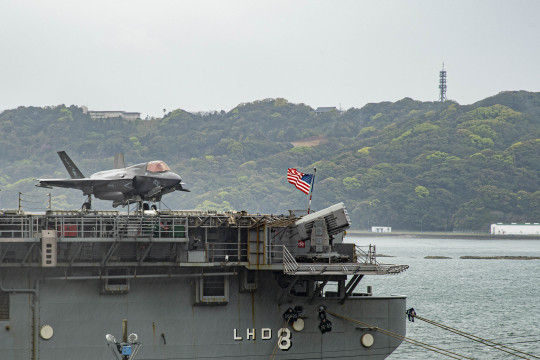
A September meeting in New York between President Joe Biden and newly installed President Ferdinand Marcos that led to the new defense agreement clearly demonstrated the shift back toward the United States.
“We obviously have to work [WITH?] them,” Manolo said, referring to China. “Equity in the maritime commons” is a foreign policy goal as Manila is “on the threshold” of becoming a regional economic power. He welcomed public and private assistance in filling infrastructure needs for future development and growth. He pointed to how important Manila can be in delivering clean energy renewables with investments made to explore its deposits of important raw earth and other green minerals.
“Multilateralism must thrive” to avoid conflict, said Manolo.
But “we want to make [discussions with China] compatible with the U.S. alliance.”
Notes and links below
Japan to join Salaknib drills between PH, US armies - “Japan is joining a large-scale joint exercise between the Philippine and US armies for the first time, a top military official said, in the latest of the emerging trilateral defense partnership of the three nations.A handful of observers from the Japan Ground Self-Defense Force (JGSDF) will participate in Salaknib (shield in the Ilocano dialect) — an annual exercise led by the Philippine Army to strengthen the readiness and interoperability with its counterparts from the United States — which will kick off next week.”
Stop US and Chinese aggression in the Philippines! Turn imperialist wars into wars against imperialism! The US is complicit in war crimes
The WACL and CAUSA’s Role in the Ruthless Violence of US-Philippines Counterinsurgency
Death Squads in the Philippines by Doug Cunningham
Those Spared in Duterte’s “War on Drugs” May Go to Moonie Rehabilitation
#imperialism#inter-imperialism#china#u.s.a.#united states of america#the philippines#philippines#ecda#enhanced defense cooperation agreement#military#u.s. military#armed forces of the philippines#afp#balikatan
1 note
·
View note
Text
ok the post i was going to make after i woke up. the reason why i've been rooting 4 sy and jessie becoming A Thing for the large recent duration of my twig read is that i liked how the dynamic was being established between them in a way that could clearly lead into a functional romance where other relationships sy has couldn't.
at one point, sy notes that he couldn't imagine a world where he was able to spend a full uninterrupted day with lillian (His Actual Girlfriend at the time) without either ruining it by upsetting her or becoming exhausted from putting effort into not upsetting her & having a terrible time himself. with jessie, after she runs away to tynewear for sy, the main point of their dynamic that wildbow hammers in over and over again is that she's someone who can spend months alone with sy and hold her ground both intellectually and emotionally without her starting to loathe him, her becoming exhausted from effort, or him becoming exhausted from effort.
and as for the reason as to Why that is. it's partially because perfect memory is very useful for interacting with sy on a daily basis, but it's also in large part because she has an Anti Sy Bullshit Field sort of personality. it's really endearing dynamic writing how she's obviously in love with him, and it never once causes her to budge where she wants to take a stand. i really fucking like the scene where she's talking to noreen to earn her cooperation after sy being a manipulative ass didn't work, and she outright agrees w noreen that a lot of the time she doesn't like sy either, with the implicit "but" (because her dialogue pattern prior had been a series of "buts" like "he's the darkest bastard i know, but he makes me laugh") being "but i love him."
and i can actually see why sy's earned that love during the tynewear arcs despite not always being very likable--when he does things like grip her by the cheeks and force her to say "okay" to being saved from the plague where anyone else would have left her for dead, it's completely understandable how she loves him despite (and sometimes because of) the fact that he frequently does shit that makes her threaten to beat him with an umbrella. i was rooting 4 them because the book was repeatedly intentionally stating that sy clearly needs a partner who's naturally enough of an intelligent hardass to be resistant to his bullshit while still caring for him deeply and enjoying his company, and jessie obviously met those criteria.
and like. this Is stated explicitly. right before the book shits itself in this department, sy horrendously upsets lillian during the "i don't like the me that says yes to sy" scene, and jessie 1. accurately bluntly explains to sy why he's on unequal footing with lillian in a way that's deeply unfair to lillian and 2. accurately implies that She is someone who would be compatible with and fair for sy to date.
where the problem comes in is that after this, sy absconds for no reason and goes on the inane slogging adventure of arc 14, while jessie is forced to be the one who chases after him, the one who apologizes and makes up for the absolutely atrocious way sy treated her over both the possibility and the outright suggestion of them dating, and the one who bends over backwards to nervously pose her transitioning as a solution to the Irreparable Friendship Ruining Gap of her being attracted to sy while they're both boys. he doesn't even become interested in her afterwards, he's not interested in her yet at the point in the story where i'm at like 15 chapters after her transition! the unrequited love is still there, it's just that it's somehow infinitely more tolerable for him if it's not coming from a boy. (sylvester lambsbridge trans-positive homophobe: very funny choice, not a good one.) yes, it's made clear that she would really genuinely like to transition for a number of other reasons as well, but it's a scene that's part of a series of scenes where, instead of getting to play the interesting hardass that calls sy out on how absolutely fucked it is that he literally intentionally mentally infantilized himself to shoot the possibility of acknowledging a boy having feelings for him in the foot--the hardass that expects him to have the faintest ounce of accountability to both her and lillian--she just. bends over backwards to accommodate and apologize and repair things with him, without him having to put in any meaningful effort despite being the one who caused the fight he ran away over in the first place.
and then after that. even after she slips a memory and becomes afraid of literally fucking dying within the next three days. she's STILL just fucking politely intermittently hoping that Maybe something will happen if sy, but no problem at all if not, she doesn't want to force anything! like i just feel bad for her at this point man. it does not feel good to watch, and it definitely does not feel coherent with what was established about her character & why she's a good match for sy previously. and i think the reason it doesn't feel coherent is that wildbow was not properly grasping why sy's treatment of her was hurtful, and he wasn't properly imagining the level of culpability sy would need to accept and act to amend in order for the dynamic to not be off-kilter and deeply unfair to jessie. like, it feels like the perspective twig is implicitly espousing is that just the mere act of sy being able to stand in the same room as jessie without getting awkward about her unrequited feelings IF and only IF she's not a boy is something involving commendable compromise and not below the literal fucking bare minimum of being able to stand in the same room as jessie without getting awkward about her unrequited feelings even if she was a boy. i find it more and more uncomfortable the longer i stew on it. i don't like it. complete fumble of their resolution of their fight and now everything after it feels tainted by that.
21 notes
·
View notes
Note
Hey, I don't know if you've been asked this already, but what's the worst Harry Potter fanfic trope? The one you where if you see it in the tags or find it reading a fic, unless the rest looks really good, you back out. For me it's Pureblood Politics. The wizarding world is so small, and the population pretty capable, that the idea of wizarding nobility doesn't make sense.
Hi 👋
Honestly, I haven't read HP fics in a while, but I can talk about what I recall from the ones I read.
I can't take crossovers in HP fic. Like, I think that's a me thing, and not exactly a trope, but whenever I see Harry Potter crossover with something else, even as some weird AU, I just can't read it. I don't know what does it to me, but HP is not meant for crossovers in my brain.
And I get what you're saying about pure-blood politics, but I think a lot of it is down to execution. Like, I think wizards do have titles (I mean, the Most Noble and Ancient House of Black is a thing), but I don't think their so-called noble class really acts like typical feudal nobility from the Middle Ages or even 19th-century aristocracy. It has some elements of it, but it's also its own thing. (talked about it more here, here, here, and here).
And regardless of how small a community is, you'd always have some form of politics. The books repeatedly show that politics and agendas definitely exist in the Wizarding World, but this isn't Game of Thrones, and their politics are not that.
They have an elected minister with way too much power, they have inter-department politics in the ministry as well. I mean, Barty Crouch Sr got demoted from head of the DMLE to head of Magical International Cooperation, so, there's something going on there. They also have a House of Lords styled parliament and high court that's based on the early pre-Norman council of the Witen. This suggests they have noble titles, but said titles probably have nothing to do with warfare and land ownership the way noble titles usually worked irl. I also don't think the titles are exclusive to pure-bloods and you likely have half-blood families in the Wizengamot, while some pure-blood, sacred 28 families aren't there (the Malfoys, for example, are explicitly stated to not be in the Wizengamot in OotP).
I also don't think they'd have any heirship/lordship rings with spells on them that pass down family lines. Historically, rings like that just weren't a thing. Since wizards rely on letters, I can see them having signet rings, which are used to sign letters and denote who wrote them, but signet rings are an individual thing, and each new "lord" (I'm sure Lucius would have one too, you don't need a noble title to make one of these. Just enough money and sense of importance) would make a new one for himself and not use an existing one because the whole idea is to ensure a specific individual signed the letter, a dead person's signet ring is no use for that assurance. They would usually include a family crest, but there would also usually be an additional personal flare.
A bit of a pet peeve of mine in that regard is when Gringotts is overused in fics. Like, Harry goes there and gets like 5 lordships or whatever in a way that makes no sense to me. I think families like Slytherin and Gaunt, for example, wouldn't really have any title anymore anyone could have (I think they lost any form of title when they lost their money and lands), and even if they did still have a title, like the Black family, Gringotts goblins are going to be the last creatures to give a shit about wizarding nobles, like, how the fuck would they know? Why would they even care? And no way in hell are they keeping goblin-made heir rings or whatever in their vaults for wizards. They'll take what they believe is rightfully theirs back.
And why would wizards allow goblins to keep these precious heirlooms? I mean, we see Grimmauld Place is filled to the brim with heirlooms and knickknacks. We see Marvolo Gaunt keep his two prized heirlooms on the family at all times. Hepzibah Smith kept Hufflepuff's Cup close to her in her home. If these signet rings I mentioned earlier existed, they'd be kept by the family, not at Gringotts.
They'd also likely not have any enchantments on them unless the owner was particularly paranoid because, again, they are only meant to sign letters for an individual, enchanted heirlooms related to any title would likely be more varied. I mean, we see the Gaunts have Slytherin's locket and the Peverell ring, the Potters have the cloak... I think it's reasonable that each family would have a completely different set of magical artifacts passed down from generation to generation, with different spells, enchantments, and history. Some families might have rings, some would have cloaks, mirrors, bracelets, swords or shields (from old times that are used as wall hangers nowadays), certain unique wands, hats, a cup (Hufflepuff), hell, it could be anything, you could have so much creative fun with magical heirlooms. And these heirlooms aren't unique to families in the Wizengamot, every old enough magical family probably has a few heirlooms.
Also, if anyone is going to know what's going on with the Wizengamot titles it's the Wizengamot Administration Services (which is an office that supposedly exists in the ministry), and no way are they going to be anything close to helpful considering they are part of the ministry. I don't think enough wizarding politics fic takes advantage of how the ministry literally has an office for everything and that there are tensions/competition between different departments and offices. That, and that the majority of the population works in the ministry one way or another.
Honestly, I get the power fantasy element these fics are going for, and I have nothing against fans who enjoy it, I just don't think it's realistic to the world-building in the books.
I got a little sidetracked, but, yeah.
#harry potter#hp#asks#anonymous#anon asks#hollowedrambling#hp fic#hp meta#hollowedtheory#wizarding politics
27 notes
·
View notes
Text
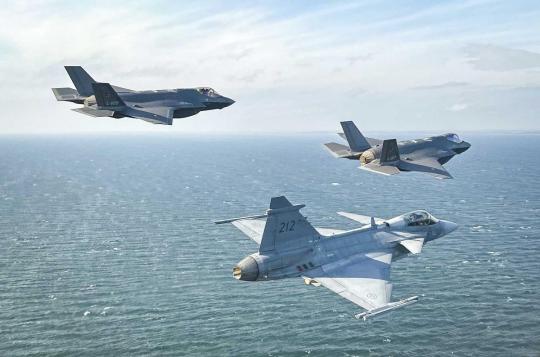
IMAGES: Swedish and F-35 Danish Gripen perform first inter-ally exercises of 5ª generation
Fernando Valduga By Fernando Valduga 15/03/2024 - 18:16in Military
For the first time as NATO Allies, Danish F-35 fighters and Swedish JAS39 Gripen fighters flew air combat training exercises in Danish airspace on March 11 and 13.
The training missions showed close military cooperation between the Danish and Swedish air forces and also demonstrated efforts to integrate and interact with different generations of fighters in the Nordic countries. The exercises were mainly conducted in separate training areas on the waters of Kattegat. They consisted of one-on-one fighter maneuvers and coordinated flight of Danish F-35s from the Skrydstrup Fighter Wing and two JAS39 Gripen from 'Blekinge Flygflottilj' in Ronneby, near Karlskrona, in southern Sweden.
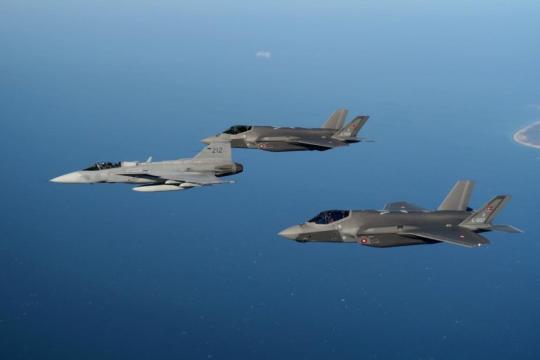
Cooperation is based on a mutual interest of the two nations through the Oresund, making use of experience and skills to strengthen the combined power of air warfare.
"Because we are neighbors and close allies, using each other's capabilities not only provides great training value for pilots and personnel, but is also visible proof of the ambition to be able to operate effectively together," says Major General of the Danish Air Force, Jan Dam.
The training exercises involving the JAS39 produced by Sweden and the F-35 produced by the United States highlight the need to ensure that existing and new combat aircraft fleets are able to cooperate and interact on the modern battlefield.

"The Gripen and F-35 belong to two different generations of combat aircraft and therefore have different characteristics to contribute to the battlefield. As a fifth-generation combat aircraft, the F-35 has the special ability to collect and process huge amounts of data, which it can later share with other allies and actors," explains Lieutenant-Colonel Casper Borge Nielsen, head of the Combat Flight Department of the Allied Air Command.
He went on to say that the integration between the F-35 and the Gripen increases the combined operational capabilities, because the F-35 is able to generate and share an unprecedented situational image, from which the Gripen can also benefit. On the other hand, the Gripen represents an advanced combat aircraft that brings more firepower to combat. This will benefit both fifth and fourth generation combat aircraft and, in a broader perspective, will give land and naval forces the opportunity to operate with more freedom and efficiency.

"Performing this type of exercise flying with another type of aircraft provides different challenges and experiences than when it is normally practiced against our own units," said Lieutenant-Colonel Erik Almquist, Commander of the 172º Swedish Air Force Fighter Squadron. “Cooperation with Danish pilots has been very easy and uncomplicated. The biggest challenge was to decide whether we should speak English or Danish/Swedish on the phone during the briefing and debriefing,” he said, adding that on the air, radio communications are made, of course, in English. "This week's exercises were the beginning of an increased cooperation where the proximity of the divisions in Skrydstrup and the simplicity of the cooperation provide good conditions for us to develop and strengthen our ability to fight together as a 'Nordic Air Force'," he concluded.
"We found our Swedish colleagues in Danish airspace to fly Basic Fighter Maneuvers (BFM), also known as 1-on-1 air combat training," says TRI, one of the Danish F-35 pilots of the Skrydstrup Fighter Wing in southern Jutland. He added that this creates different requirements and challenges when training against an unknown opponent. "Most of the time, we fly BFM against our own F-35 pilots. The Gripen and the Swedish pilots fly differently, so a 1-on-1 match against them is a professional challenge. We can test elements of our own tactics that we don't normally do. It's amazing! And of course it's great to meet the Swedes in Denmark," concluded TRI.
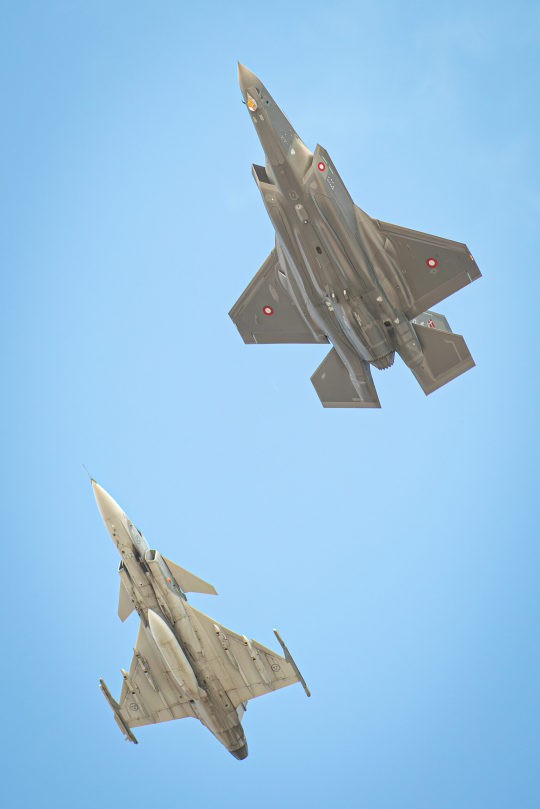
In the fall of 2023, Denmark received the first four F-35 fighters on Danish soil, while six aircraft are still located in the US for training flights. In total, Denmark has invested in 27 F-35 fighters, of which the remaining 17 are expected to be delivered in the coming years.
Tags: Military AviationF-35 Lightning IIFlygvapnet - Swedish Air ForceJAS39 GripenNATO - North Atlantic Treaty Organization
Sharing
tweet
Fernando Valduga
Fernando Valduga
Aviation photographer and pilot since 1992, he has participated in several events and air operations, such as Cruzex, AirVenture, Dayton Airshow and FIDAE. He has works published in specialized aviation magazines in Brazil and abroad. He uses Canon equipment during his photographic work in the world of aviation.
Related news
HELICOPTERS
Indian government signs contract with HAL to buy 34 Dhruv light helicopters
15/03/2024 - 16:00
MILITARY
Shield AI will integrate Artificial Intelligence pilot in the Kratos BQM-177A drone.
15/03/2024 - 14:00
AIR SHOWS
It's less than a month before FIDAE 2024 opens its doors to the world
15/03/2024 - 13:00
MILITARY
Canadian Air Force received its first CE-145C Vigilance
15/03/2024 - 11:30
BRAZIL
Brazilian Air Force starts study to activate a second squadron of F-39 Gripen fighters: the "Pacau"
14/03/2024 - 21:30
EMBRAER
Embraer and ST Engineering sign agreement on the C-390 aircraft in the Asia-Pacific region and South America
14/03/2024 - 19:59
40 notes
·
View notes
Text
by Gnasher Jew
Chrispin Phiri is the spokesperson for current Minister of International Relations and Cooperation Ronald Lamola and the Department of International Relations and Cooperation (DIRCO) in South Africa. He made several antisemitic statements that call into question his suitability for his role.
Phiri was part of the delegation that presented a controversial “genocide case” against Israel at the International Court of Justice (ICJ) in The Hague, and he moderated a press briefing by the South African and Palestinian delegations, which included a known terrorist.
On October 7th, during the Hamas attacks and massacre of Israeli civilians, Phiri posted #FreePalestine on social media platform X, which suggests that he supports those attacks. A review of his activity on the platform reveals that he advocates for the end of the state of Israel and promotes the slogan “From the river to the sea Palestine will be free.” A genocidal chant developed by the terrorist Palestine Liberation Organization (PLO) in the 1960s.

An older post from 2019 has also emerged, in which Phiri referred to “The zionist [sic] Delusional Mentality,” and linked to a blog post that denies a Jewish connection to the land of Israel, calls modern Jews “European invaders” and “colonizers,” and dismisses the Torah as “Talmudic fairytales.”
13 notes
·
View notes
Text


Official Communication from Vernick Palace
VERNICK PALACE, VK-- We are pleased to announce that the Her Majesty's government, under the leadership of First Wählen** Christine Weily, has been chosen to host the esteemed R4 member-nations during the forthcoming 4-day R4 Cconference.
The R4 summit, is a distinguished regional symposium, created to cultivate both pragmatic and economical solutions to shared affairs and mutual opportunities. The participants of the event represent a diverse assembly of heads of state, leaders, ministers, and policy-makers. The R4's member-nations stand as a decisive voice in matters of inter-regional, international, and global significance, controlling over an estimated third of the regional economy.
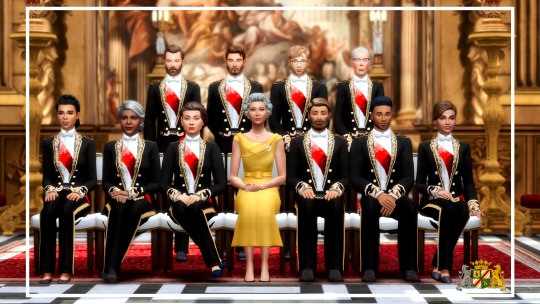
(Her Majesty poses with the First Whäler and Primar Council, the most Senior members of Her government, in Chandler's Keep's Great Hall.)
The member-nations gracing the event include:
The Kingdom of Vernick (@housekonig)
United States of Simerica (NPC Nation Version)
The Kingdom of SimDonia (@bridgeportbritt)
The Empire of Pierreland (@officalroyalsofpierreland)
The Trentallia Union (@trentonsimblr)
The Kingdom of Uspana (@nexility-sims)
The Ionian Union (@funkyllama)
Empire of Francesim (@empiredesimparte)
The Kingdom of Illyria (@the-lancasters)
The conference is set to start in two weeks.
We assure all nations of our steadfast commitment to foster meaningful dialogue and cooperation during this remarkable summit.
First Wählen - The conference and conversations with @hormelfoods encouraged me to rethink my world, so the President/Elected Minister has been changed to the First Wählen, a rough google translation. In the setting of my story, it simply means "the elected one".
Primar Council - The Primar Council are the core member's of the First Wäheln's cabinet and are constitutionally required to be filled before Her Majesty grant the Wäheln permission to form a government in Her name. Rough google translation of primary council.
#housekonig#ts4 royal#ts4 royalty#ts4 royal legacy#ts4 royal family#konig.story#the sims 4 monarchy#the sims 4 royal family#R4conferece#imissthisstyleofroyalsimblr
56 notes
·
View notes
Note
what the hell is graceland about besides people getting hurt lmao
LOL Okay so the show is about this group of agents from three different United States law enforcement agencies (FBI, DEA, and Customs) who all live in this recovered drug house in California nicknamed Graceland. They're specialty is undercover work. So they all live together and help each other out on missions. The goal is inter-agency cooperation and the agents, by living together, can watch each others backs and this house will be like a safe haven for them. The show follows rookie FBI agent Mike Warren as he joins the Graceland house for his very first assignment. There he meets his mentor Paul Briggs (whom he is secretly investigating) FBI, Paige Arkin DEA, Johnny Tutorro FBI, Charlie DeMarco FBI, and Dale Jakes ICE. Along with all the cases they handle, things kinda go overboard as they get sucked into their undercover personas and personal issues. Things get CRAZY. Like you have no idea how crazy shit becomes in just 3 seasons. I love it. There's good whump for everyone in the show too which is super nice.
15 notes
·
View notes
Text
Marcos Jr. sells out PH sovereignty for US war preparations vs China
NDF-International | National Democratic Front of the Philippines
April 10, 2024
Marcos Jr.’s trip to the United States for a trilateral summit with US President Joe Biden and Japanese Prime Minister Fumio Kishida is an utter and complete sell-out of Philippine sovereignty to US war designs in Asia. The so-called “trilateral summit” is set to discuss “maritime security cooperation” between the three countries.
Marcos Jr. is willingly offering the Philippine archipelago to serve as a ‘theater of war’ by allowing the US to position its military arsenal on land, sea, and air. The Philippines is a crucial piece in the “US Island Chain strategy” to contain China. The Philippines’ strategic location allows the US to constrict regional waterways and position readily deployable military air power in close proximity to China. In order to achieve its objectives, the US is escalating war preparations in the region by encouraging Japan and other imperialist allies to join the geopolitical chess game.
In the said trilateral meeting, Marcos Jr. seeks to further increase US military footprint in Philippine soil while talks are underway with Japan for a reciprocal access agreement that will allow Japanese military presence in the country. In fact, preparations are already ongoing for the biggest Balikatan Exercises in history which is expected to draw at least 16,000 troops to participate. The Balikatan war games this year aims to test the so-called ‘Comprehensive Archipelagic Defense Concept (CDAC)’ patterned after US imperialist war plans in the region. These actions form part of the US strategy to provoke China into “firing the first shot” demonstrating the US government’s bloodthirst.
On the other hand, Marcos Jr.’s actions prove his outright subservience to US imperialist war preparations and his readiness to drag the Filipino people in the middle of a brewing inter-imperialist conflict. Marcos Jr. must be held accountable for his reprehensible sell-out of Philippine sovereignty and his blatant disregard for the lives of the Filipino masses. More importantly, the Biden administration must be denounced for its continued exportation of wars of aggression from Ukraine to Palestine and now using the Philippines as a pawn in its attempt to stifle China’s growing influence.
35 notes
·
View notes
Text
Q&A with Tabata Amaral: “It’s Impossible to Talk About Meritocracy in a Country as Unequal as Brazil. We Need a Robust and Qualified Expansion of Basic and Higher Education”

In Brazil, efforts to build a legitimate and lasting democratic project must respond to the historical challenges and realities of a majority Afro-descendant population (55.5 percent, according to the 2022 census). While Brazil often projects an image of racial harmony abroad, its Black population faces severe economic, social, and political disadvantages at home. This disconnect limits Brazil’s potential for development, preventing it from leveraging its diverse society to address regional challenges in a hemisphere that yearns for innovative responses to inequality, social cohesion, and citizenship safeguards.
The context for this interview series could not be more appropriate. Recently, discussions over Brazilian inequalities, especially ethnoracial ones, have regained visibility at home and abroad. In 2023, the federal government re-established the Ministry of Racial Equality and the Ministry of Indigenous Peoples, bodies responsible for implementing public policies to combat racism and promote the rights of Black and Indigenous populations, respectively. In addition, the country is reforming the national curriculum frameworks for secondary education, which could present a window of opportunity to address educational deficits and consider the demands of historically marginalized populations.
At the international level, while participating in the 78th Session of the United Nations General Assembly, Brazil voluntarily adopted the 18th Sustainable Development Goal (SDG) related to racial equality (in addition to the current 17 SDGs of the 2030 Agenda). In addition, the Lula and Biden administrations resumed the Joint Action Plan to Eliminate Racial and Ethnic Discrimination and Promote Equality (JAPER), an initiative focused on education, healthcare, violence reduction, justice, and preserving the culture and memory of marginalized racial and ethnic populations. Similarly, Brazil has established cooperation channels with countries such as Colombia and Spain, providing exchange activities and sharing experiences of overcoming racism in scientific research, education, history, and culture. Also, during Brazil’s presidency of the G20, the country focused on inequality as the central theme of its four priorities at last year’s summit in Rio: sustainable development, social inclusion, the fight against hunger and poverty, and global governance reforms.
Considering the context and seeking to understand how the Brazilian education system produces unequal educational development trajectories, we spoke to Tabata Amaral, federal deputy of the state of São Paulo and member of the Inter-American Dialogue. Amaral dedicates herself to issues of education, women’s rights, inequalities, and social development.
Continue reading.
#brazil#brazilian politics#politics#education#antiracism#tabata amaral#image description in alt#mod nise da silveira
6 notes
·
View notes
Text
idea:
a truck simulator / road trip style videogame but set in a transportpunk utopia
everything that can fit into a standard shipping container gets sent via freight rail. bridges over the bering, darién, gibraltar, york, dover and malacca carry ultrafast freight trains faster than Concorde, and conventional rail lines carry it further. there’s even automated sorting centres passing consumer packages onto delivery ‘vans’ which use the tram/trolley system, getting packages from another continent alll the way to your doorstep. it’s paradise
that’s all, of course, for everything that fits within a regulation-size shipping container. everything that fits in the rail system
you are a member of the hauliers’ cooperative. road haulage is for oversize loads only. your job is oversize loads
the motorways have either been replaced with new rail lines piggybacking their infrastructure, or they’ve been totally demolished – so you only have access to the regular old inter-town highways, or worse. many of these roads are in a bit of a state –claimed by potholes, overgrown with moss, flooded completely – so these deliveries need the hand of a professional
there’s not been zero advancement of battery-powered vehicles, not at all. your cab is proper cush with no pesky combustion engine in the way, and you’ve even got power delivery to your rear wheels to control the position of your ass. what’s more, space technology has replaced your wheel systems with the wheel-feet seen on planetary explorers, allowing for omnidirectional travel and perfect manoeuvrability. this is offroading, despite being on the road. your absolute top speed is probably 80kph in ideal safe flat conditions
with six hours a day (including lunch, with two hours possible overtime) you’ll be clearing a couple hundred k per day, from city to city. end your shift by plugging in at a chargepoint at the city’s truckstop, from where you can use the public transit system to see the sights, get some scran, and kip at a local bunkhouse (all free of charge). workers’ rights apply to you, of course
HSR connects cities, commuter rail connects towns, light rail connects large villages, and rural literail connects small villages – so the only private vehicles on the roads are typically carrying those who live outside villages to their local park & ride. most are ebikes. many walk
with almost no cars, with no buses, with no standard-size lorries, the roads are near-empty for traffic. with the road system massively scaled back, with swathes of agricultural land deprecated for rewilding, with massive curtailment of exurban sprawl through densification, the vistas you see are incredible
you are a part of the world and must work with it. the 4x4 (or more) nature of your vehicle is you communicating with the world around you, touching and feeling it to make your way through. you are not here to bulldoze and pave and carve a path, you’re negotiating access. this is why you’re a professional
13 notes
·
View notes
Text
Inter-State Meeting on Naxalism Convenes in Ranchi
Top police officials discuss enhanced cooperation against Left Wing Extremism A crucial inter-state coordination meeting on Naxalism brought together top police officials from Jharkhand and neighboring states in Ranchi. RANCHI – The Union Home Ministry organized a critical inter-state coordination meeting in Ranchi, focusing on combating Naxalism and enhancing cooperation among affected…
#anti-Naxal operations#राज्य#border state cooperation#DGP Anurag Gupta#intelligence sharing#Inter-state Naxalism meeting#Jharkhand police#joint security measures#Left Wing Extremism#Ranchi coordination#state#Union Home Ministry
0 notes
Text
In February 1994, in the grand ballroom of the town hall in Hamburg, Germany, the president of Estonia gave a remarkable speech. Standing before an audience in evening dress, Lennart Meri praised the values of the democratic world that Estonia then aspired to join. “The freedom of every individual, the freedom of the economy and trade, as well as the freedom of the mind, of culture and science, are inseparably interconnected,” he told the burghers of Hamburg. “They form the prerequisite of a viable democracy.” His country, having regained its independence from the Soviet Union three years earlier, believed in these values: “The Estonian people never abandoned their faith in this freedom during the decades of totalitarian oppression.”
But Meri had also come to deliver a warning: Freedom in Estonia, and in Europe, could soon be under threat. Russian President Boris Yeltsin and the circles around him were returning to the language of imperialism, speaking of Russia as primus inter pares—the first among equals—in the former Soviet empire. In 1994, Moscow was already seething with the language of resentment, aggression, and imperial nostalgia; the Russian state was developing an illiberal vision of the world, and even then was preparing to enforce it. Meri called on the democratic world to push back: The West should “make it emphatically clear to the Russian leadership that another imperialist expansion will not stand a chance.”
At that, the deputy mayor of St. Petersburg, Vladimir Putin, got up and walked out of the hall.
Meri’s fears were at that time shared in all of the formerly captive nations of Central and Eastern Europe, and they were strong enough to persuade governments in Estonia, Poland, and elsewhere to campaign for admission to NATO. They succeeded because nobody in Washington, London, or Berlin believed that the new members mattered. The Soviet Union was gone, the deputy mayor of St. Petersburg was not an important person, and Estonia would never need to be defended. That was why neither Bill Clinton nor George W. Bush made much attempt to arm or reinforce the new NATO members. Only in 2014 did the Obama administration finally place a small number of American troops in the region, largely in an effort to reassure allies after the first Russian invasion of Ukraine.
Nobody else anywhere in the Western world felt any threat at all. For 30 years, Western oil and gas companies piled into Russia, partnering with Russian oligarchs who had openly stolen the assets they controlled. Western financial institutions did lucrative business in Russia too, setting up systems to allow those same Russian kleptocrats to export their stolen money and keep it parked, anonymously, in Western property and banks. We convinced ourselves that there was no harm in enriching dictators and their cronies. Trade, we imagined, would transform our trading partners. Wealth would bring liberalism. Capitalism would bring democracy—and democracy would bring peace.
After all, it had happened before. Following the cataclysm of 1939–45, Europeans had indeed collectively abandoned wars of imperial, territorial conquest. They stopped dreaming of eliminating one another. Instead, the continent that had been the source of the two worst wars the world had ever known created the European Union, an organization designed to find negotiated solutions to conflicts and promote cooperation, commerce, and trade. Because of Europe’s metamorphosis—and especially because of the extraordinary transformation of Germany from a Nazi dictatorship into the engine of the continent’s integration and prosperity—Europeans and Americans alike believed that they had created a set of rules that would preserve peace not only on their own continents, but eventually in the whole world.
This liberal world order relied on the mantra of “Never again.” Never again would there be genocide. Never again would large nations erase smaller nations from the map. Never again would we be taken in by dictators who used the language of mass murder. At least in Europe, we would know how to react when we heard it.
But while we were happily living under the illusion that “Never again” meant something real, the leaders of Russia, owners of the world’s largest nuclear arsenal, were reconstructing an army and a propaganda machine designed to facilitate mass murder, as well as a mafia state controlled by a tiny number of men and bearing no resemblance to Western capitalism. For a long time—too long—the custodians of the liberal world order refused to understand these changes. They looked away when Russia “pacified” Chechnya by murdering tens of thousands of people. When Russia bombed schools and hospitals in Syria, Western leaders decided that that wasn’t their problem. When Russia invaded Ukraine the first time, they found reasons not to worry. Surely Putin would be satisfied by the annexation of Crimea. When Russia invaded Ukraine the second time, occupying part of the Donbas, they were sure he would be sensible enough to stop.
Even when the Russians, having grown rich on the kleptocracy we facilitated, bought Western politicians, funded far-right extremist movements, and ran disinformation campaigns during American and European democratic elections, the leaders of America and Europe still refused to take them seriously. It was just some posts on Facebook; so what? We didn’t believe that we were at war with Russia. We believed, instead, that we were safe and free, protected by treaties, by border guarantees, and by the norms and rules of the liberal world order.
With the third, more brutal invasion of Ukraine, the vacuity of those beliefs was revealed. The Russian president openly denied the existence of a legitimate Ukrainian state: “Russians and Ukrainians,” he said, “were one people—a single whole.” His army targeted civilians, hospitals, and schools. His policies aimed to create refugees so as to destabilize Western Europe. “Never again” was exposed as an empty slogan while a genocidal plan took shape in front of our eyes, right along the European Union’s eastern border. Other autocracies watched to see what we would do about it, for Russia is not the only nation in the world that covets its neighbors’ territory, that seeks to destroy entire populations, that has no qualms about the use of mass violence. North Korea can attack South Korea at any time, and has nuclear weapons that can hit Japan. China seeks to eliminate the Uyghurs as a distinct ethnic group, and has imperial designs on Taiwan.
We can’t turn the clock back to 1994, to see what would have happened had we heeded Lennart Meri’s warning. But we can face the future with honesty. We can name the challenges and prepare to meet them.
There is no natural liberal world order, and there are no rules without someone to enforce them. Unless democracies defend themselves together, the forces of autocracy will destroy them. I am using the word forces, in the plural, deliberately. Many American politicians would understandably prefer to focus on the long-term competition with China. But as long as Russia is ruled by Putin, then Russia is at war with us too. So are Belarus, North Korea, Venezuela, Iran, Nicaragua, Hungary, and potentially many others. We might not want to compete with them, or even care very much about them. But they care about us. They understand that the language of democracy, anti-corruption, and justice is dangerous to their form of autocratic power—and they know that that language originates in the democratic world, our world.
This fight is not theoretical. It requires armies, strategies, weapons, and long-term plans. It requires much closer allied cooperation, not only in Europe but in the Pacific, Africa, and Latin America. NATO can no longer operate as if it might someday be required to defend itself; it needs to start operating as it did during the Cold War, on the assumption that an invasion could happen at any time. Germany’s decision to raise defense spending by 100 billion euros is a good start; so is Denmark’s declaration that it too will boost defense spending. But deeper military and intelligence coordination might require new institutions—perhaps a voluntary European Legion, connected to the European Union, or a Baltic alliance that includes Sweden and Finland—and different thinking about where and how we invest in European and Pacific defense.
If we don’t have any means to deliver our messages to the autocratic world, then no one will hear them. Much as we assembled the Department of Homeland Security out of disparate agencies after 9/11, we now need to pull together the disparate parts of the U.S. government that think about communication, not to do propaganda but to reach more people around the world with better information and to stop autocracies from distorting that knowledge. Why haven’t we built a Russian-language television station to compete with Putin’s propaganda? Why can’t we produce more programming in Mandarin—or Uyghur? Our foreign-language broadcasters—Radio Free Europe/Radio Liberty, Radio Free Asia, Radio Martí in Cuba—need not only money for programming but a major investment in research. We know very little about Russian audiences—what they read, what they might be eager to learn.
Funding for education and culture needs rethinking too. Shouldn’t there be a Russian-language university, in Vilnius or Warsaw, to house all the intellectuals and thinkers who have just left Moscow? Don’t we need to spend more on education in Arabic, Hindi, Persian? So much of what passes for cultural diplomacy runs on autopilot. Programs should be recast for a different era, one in which, though the world is more knowable than ever before, dictatorships seek to hide that knowledge from their citizens.
Trading with autocrats promotes autocracy, not democracy. Congress has made some progress in recent months in the fight against global kleptocracy, and the Biden administration was right to put the fight against corruption at the heart of its political strategy. But we can go much further, because there is no reason for any company, property, or trust ever to be held anonymously. Every U.S. state, and every democratic country, should immediately make all ownership transparent. Tax havens should be illegal. The only people who need to keep their houses, businesses, and income secret are crooks and tax cheats.
We need a dramatic and profound shift in our energy consumption, and not only because of climate change. The billions of dollars we have sent to Russia, Iran, Venezuela, and Saudi Arabia have promoted some of the worst and most corrupt dictators in the world. The transition from oil and gas to other energy sources needs to happen with far greater speed and decisiveness. Every dollar spent on Russian oil helps fund the artillery that fires on Ukrainian civilians.
Take democracy seriously. Teach it, debate it, improve it, defend it. Maybe there is no natural liberal world order, but there are liberal societies, open and free countries that offer a better chance for people to live useful lives than closed dictatorships do. They are hardly perfect; our own has deep flaws, profound divisions, terrible historical scars. But that’s all the more reason to defend and protect them. Few of them have existed across human history; many have existed for a time and then failed. They can be destroyed from the outside, but from the inside, too, by divisions and demagogues.
Perhaps, in the aftermath of this crisis, we can learn something from the Ukrainians. For decades now, we’ve been fighting a culture war between liberal values on the one hand and muscular forms of patriotism on the other. The Ukrainians are showing us a way to have both. As soon as the attacks began, they overcame their many political divisions, which are no less bitter than ours, and they picked up weapons to fight for their sovereignty and their democracy. They demonstrated that it is possible to be a patriot and a believer in an open society, that a democracy can be stronger and fiercer than its opponents. Precisely because there is no liberal world order, no norms and no rules, we must fight ferociously for the values and the hopes of liberalism if we want our open societies to continue to exist.
23 notes
·
View notes
Text
Thirst - Chapter 16
Summary: Post-Avengers AU, where Loki has been sent to Earth on probation, to be a consultant to SHIELD and take part in inter-realm missions. Loki and OFC get stranded on a harsh arid planet after completing their mission, and their only option is to wait for a rescue. In the meantime, they run out of food and water. While Loki can survive without sustenance, she cannot, and she has to rely on a rather unconventional source of sustenance for her survival - Loki’s cum. And Loki is very conflicted about this. Thus begins an adventure for both Loki and OFC, filled with romance and some plot twists.
**This is a crack fic, with humour and some feels**
(I don't have a fic banner for this one, sadly, so just have a lovely Loki gif instead.)

“I heard you’d returned to Earth and had to come and see it for myself,” Fury stated as Loki, Thor and Tony Stark sat down with him in Stark’s conference chamber. He kept glancing at the door, though, which betrayed the true intent of his visit.
“Marie’s not coming,” Loki answered as Stark handed him the file containing SHIELD’s present problems.
“Why?” Fury asked, a bit surprised to see the file. “Is she scared to see me?”
“Actually, you should be scared to see her.” Tony beat Loki in answering him. “She’s mighty pissed at you.”
Fury feigned to be offended. “What did I do? I’m cooperating with Asgard.” He gave Loki a look that said that he accepted Asgard’s involvement in her life now, which was rather telling.
“You’re a snitch, that’s why. Why did you inform her parents about her arrival and relationship with Loki? That info wasn’t yours to tell.”
Fury shrugged, suddenly pretending to be occupied by the contents of the file. Loki knew that soon, he’d not be pretending at all. The revelations in the file were going to startle him.
“I thought a family reunion couldn’t hurt.”
“No, you wanted to create pressure on her to stay on Earth,” Tony continued. “So that she and Loki could be exploited by you some more.”
Tony waited for a response, but none came from Fury, for he had likely found the information about Hydra in the file by now.
Like clockwork, his eye widened. “The fuck…?”
[READ MORE]
#loki fanfiction#loki fanfics#loki fanfic#loki x reader#loki/reader#loki x ofc#loki romance#mcu loki#loki odinson#marvel#my loki fic#marvel fanfiction#loki feels#action and romance#citrus be here#grapefruit on citrus scale#loki+fanfiction#loki-fanfiction#my loki fanfiction#my wip#Thirst#Thirst Loki fanfiction#og loki my beloved#loki mcu
55 notes
·
View notes
Text
Vampire Clan: Tremere

The Broken Clan, Warlocks, Wizards, Magi, Usurpers, Grayfaces, Tremores ("Trembling Ones"), the Pyramid
The Clan of Tremere, although one of the younger vampiric clans, came into being during the Dark Ages. Despite their relatively brief existence, these Warlocks have swiftly risen to prominence within the vampire society and are arguably the most formidable clan in the modern nights. Their ascent to power can be attributed to their strict hierarchical structure, enigmatic nature, and mastery of Blood Sorcery, traits that provoke suspicion, fear, and admiration among other vampires. While aligned with the Camarilla, the Warlocks maintain a somewhat separate identity, serving as one of its principal defenders. Some even regard themselves as the next stage in the evolution of vampirism, supported by their unparalleled proficiency in blood magic and the absence of a conventional clan curse, which grants them extraordinary adaptability.
Disciplines: Auspex, Dominate, Blood Sorcery
Bane - Deficient Blood: The Tremere are no longer able to create Blood Bonds with other Kindred through normal means. A Tremere can still bind mortals and ghouls, though the corrupted vitae must be drunk an additional number of times equal to the vampire’s Bane Severity for the bond to form.
Organization
The Tremere clan boasts an unparalleled level of organization, with a clear hierarchy dictating the authority of each member. This structure presents a facade of unity and cooperation to outsiders, as most Cainites remain ignorant of the intricate Tremere inner politics and the true extent of their hierarchical system. At the pinnacle of this pyramid stands the founder and namesake of the clan, the mythical Antediluvian Tremere. However, few have ever witnessed his presence or observed his direct influence, leading some to question if he is a mere embodiment of the Tremere cause or a symbolic representation of their collective purpose.
Below the enigmatic Antediluvian, the significance of the number seven resonates throughout the Tremere hierarchy. The Inner Council of Seven, known as Councilors, holds true power within the clan. Each Councilor assumes responsibility for directing the clan's endeavors in a specific region of the world and appoints seven Pontifices.
Pontifices, in turn, govern larger territories such as portions of a nation or clusters of smaller countries and islands. Each Pontifex oversees seven Lords who utilize their influence and knowledge to sway Tremere affairs within their respective domains.
Lords bear the responsibility of governing small countries or groups of states, acting as influential figures who oversee the Tremere within their territories, particularly the Regents.
Regents, the most visible symbols of Tremere authority, preside over individual chantries and ensure their smooth operation.
Magisters, on the other hand, hold a different role within the hierarchy. They are trusted advisors who mediate inter-chantry disputes and provide guidance. Additionally, Magisters undertake the important task of educating and caring for the well-being of Apprentices.
Apprentices form the youngest and largest segment of the Tremere clan. Their time is primarily dedicated to training, serving the needs of their respective chantries, and navigating the clan's political landscape to the best of their inexperienced abilities. Some Apprentices remain at this rank indefinitely, either due to their focus on Camarilla politics or their personal affairs, or simply because the regional Lord deems it unnecessary to establish a new chantry and appoint a regent.
Acolytes represent those below the Apprentices, including Tremere who have yet to be fully accepted into the clan, awaiting their opportunity to prove their worth.
34 notes
·
View notes
Text










Yukon River, Whitehorse (No. 1)
The Yukon River is a major watercourse of northwestern North America. From its source in British Columbia, Canada, it flows through Canada's territory of Yukon (itself named after the river). The lower half of the river continues westward through the U.S. state of Alaska. The river is 3,190 kilometres (1,980 mi) long and empties into the Bering Sea at the Yukon–Kuskokwim Delta. The average flow is 6,400–7,000 m3/s (230,000–250,000 cu ft/s). The total drainage area is 833,000 km2 (321,500 sq mi), of which 323,800 km2 (125,000 sq mi) lies in Canada. The total area is more than 25% larger than Texas or Alberta.
The longest river in Alaska and Yukon, it was one of the principal means of transportation during the 1896–1903 Klondike Gold Rush. A portion of the river in Yukon—"The Thirty Mile" section, from Lake Laberge to the Teslin River—is a national heritage river and a unit of Klondike Gold Rush International Historical Park. Paddle-wheel riverboats continued to ply the river until the 1950s, when the Klondike Highway was completed. After the purchase of Alaska by the United States in 1867, the Alaska Commercial Company acquired the assets of the Russian-American Company and constructed several posts at various locations on the Yukon River.
The Yukon River has a recent history of pollution from military installations, dumps, wastewater, and other sources. However, the Environmental Protection Agency does not list the Yukon River among its impaired watersheds, and water-quality data from the U.S. Geological Survey shows relatively good levels of turbidity, metals, and dissolved oxygen. The Yukon and Mackenzie rivers have much higher suspended sediment concentrations than the great Siberian Arctic rivers.
The Yukon River Inter-Tribal Watershed Council, a cooperative effort of 70 First Nations and tribes in Alaska and Canada, has the goal of making the river and its tributaries safe to drink from again by supplementing and scrutinizing government data.
Source: Wikipedia
#Whitehorse#Yukon#travel#original photography#vacation#tourist attraction#landmark#cityscape#landscape#Yukon River#summer 2023#woods#forest#flora#nature#mountains#the North#fireweed#widlflower#river bank#Canada#architecture#SS Klondike#clouds
8 notes
·
View notes